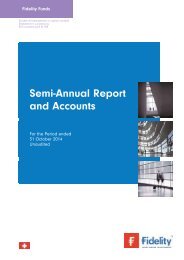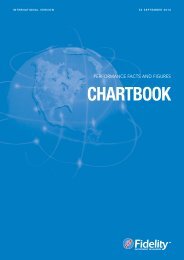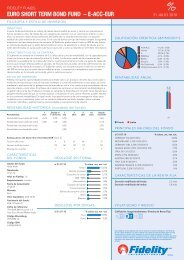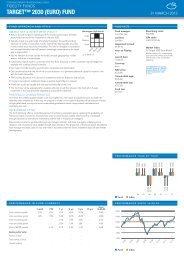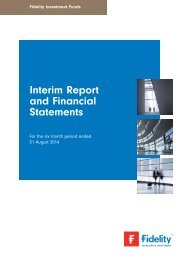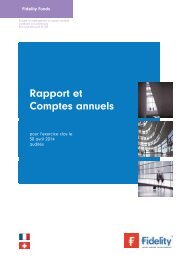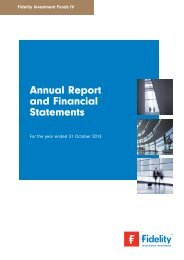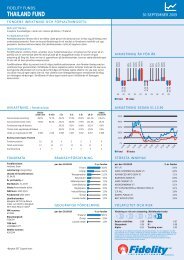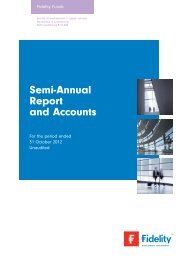Semi-Annual Reports and Accounts - Fidelity Worldwide Investment
Semi-Annual Reports and Accounts - Fidelity Worldwide Investment
Semi-Annual Reports and Accounts - Fidelity Worldwide Investment
You also want an ePaper? Increase the reach of your titles
YUMPU automatically turns print PDFs into web optimized ePapers that Google loves.
FIDELITY MULTI ASSET OPEN DEFENSIVE FUNDINVESTMENT OBJECTIVE AND POLICYThe fund aims to provide long term capital growth from exposure to globalmarkets in mostly bonds <strong>and</strong> cash <strong>and</strong> it may also have exposure to equities,property <strong>and</strong> commodities. The Fund will invest in collective investment schemesincluding those managed by <strong>Fidelity</strong> <strong>and</strong> may also invest in transferablesecurities, money market instruments, cash <strong>and</strong> deposits. Derivatives <strong>and</strong>forward transactions may also be used for investment purposes.NB: It is anticipated that as an "open" fund, investment shall be made in bothfunds managed by third party fund providers <strong>and</strong> funds managed by <strong>Fidelity</strong><strong>and</strong> in such proportions as the investment manager may decide in pursuit ofthe investment strategy.FUND MANAGER’S COMMENTARYMARKET REVIEWMost asset classes generated small but positive returns over the period.Commodities advanced the most due to higher prices in the energy <strong>and</strong>agricultural sectors. Energy prices rose due to the unseasonably cold winter inthe US, while the drought in Brazil drove up coffee prices to a record high.Meanwhile, improving economic data in developed countries supported equitymarkets. However worries about the impact of the reduction in money supplyby the US Federal Reserve (Fed), concerns about slower growth in China <strong>and</strong>geopolitical tensions in Ukraine limited gains. Within fixed income assets, highyield <strong>and</strong> corporate bonds benefited from investors’ search for returns.Property shares underperformed other asset classes following the Fed’sannouncement that it could begin tapering money supply. This could lead toa rise in interest rates, which would likely impact property shares as they aresensitive to changes in interest rates.PORTFOLIO ACTIVITYThe underweight position in commodities, the best performing asset class, hurtreturns. An overweight allocation to Japan, which underperformed otherregions due to concerns about the impact of a sales tax hike on consumptionspending, also weakened performance. Meanwhile, the selection ofunderlying managers in the equity segment detracted from returns. Notably, inthe US, William Blair US Small-Mid Cap Growth Fund hurt performance assmall sized stocks underperformed their larger counterparts. Elsewhere, theEuropean segment had a bias towards managers who invest in growth stocks(companies whose earnings are expected to grow rapidly). However, thesestocks underperformed the broader market as investor focus shifted toundervalued stocks. Within the UK, the performance of selected managers washurt by their allocation to small sized stocks <strong>and</strong> lack of exposure to the healthcare sector. Small sized stocks fell sharply following a period of strongperformance, while the health care sector gained due to merger <strong>and</strong>acquisition news. In contrast, the bonds segment supported returns. Positionsin PIMCO Capital Securities Fund <strong>and</strong> <strong>Fidelity</strong> Strategic Bond Fund benefitedfrom the strong performance of financial bonds <strong>and</strong> corporate bonds,respectively. We sold Northern Trust European Equity Index Fund <strong>and</strong> NorthernTrust Emerging Markets Equity Index Fund. <strong>Fidelity</strong> UK Smaller Companies wasalso sold after a period of strong performance. Positions in Franklin UK SmallerCompanies Fund, MFS Meridian UK Equity Fund, <strong>Fidelity</strong> Index EmergingMarkets Fund <strong>and</strong> PIMCO Capital Securities Fund were purchased. In theEurope ex UK segment, we bought Invesco Continental European Equity toreduce the overweight stance in growth stocks.OUTLOOKCentral banks in most developed countries continue to support theireconomies by maintaining adequate money supply, which should supportequity market performance. However, slower growth in China <strong>and</strong> geopoliticaltensions in Ukraine make us cautious about the outlook. Commodities could behurt by weak dem<strong>and</strong> from China, which is a major consumer of metals usedin manufacturing. Elsewhere, interest rate sensitive assets such as propertyshares <strong>and</strong> bonds are likely to be hurt when interest rates rise from historiclows.PERFORMANCE RECORDDISCRETE 1 YEAR PERFORMANCE OVER THE LAST 5 YEARS TO:30/04/10 30/04/11 30/04/12 30/04/13 30/04/14Gross paying YAccumulation Shares** - - - - 0.1Y Accumulation Shares - - - - -0.2Gross paying <strong>Fidelity</strong>PathFinder Freedom 1Accumulation Shares** - - - - -0.3<strong>Fidelity</strong> PathFinder Freedom 1Accumulation Shares - - - - -0.5Gross paying NAccumulation Shares** - - - - -N Accumulation Shares - - - - -Gross paying <strong>Fidelity</strong>PathFinder Freedom 1Accumulation (clean) Shares** - - - - -<strong>Fidelity</strong> PathFinder Freedom 1Acc (clean) Shares - - - - -* Comparative Index - - - - -0.6* Comparative Index: Comprises 5% Dow Jones - UBS Commodity Index Total Return, 5% FTSE All ShareIndex, 25% GBP 1 Week LIBID, 50% The BofA Merrill Lynch Sterling Large Cap Index (Net), 10% MSCIAll Countries World Index (Net) & 5% FTSE EPRA/NAREIT Developed Index (G)Source: <strong>Fidelity</strong> <strong>and</strong> RIMES, bid to bid, UK£, net income reinvested,** gross income reinvested. Past performance is not a realiable indicator offuture results.RISK PROFILEIf you make regular withdrawals from your investment, this may reduce yourcapital over time if the fund’s growth does not compensate for the withdrawals.The value of investments <strong>and</strong> the income from it can go down as well as up soyou may not get back the amount you invested. Some funds will invest in ‘subinvestmentgrade’ bonds. These bonds may produce a higher level of incomethan ‘investment grade’ bonds but at a higher risk to your capital. With fundsthat invest in bonds, cash or other money market instruments there is a risk thatthe issuer may default. The likelihood of this happening will depend on thecredit-worthiness of the issuer. The risk of default is usually greatest with bondsthat are classed as sub-investment grade. Some funds are able to invest someor all of their assets in developing overseas markets which carry a higher riskthan investing in larger established markets. <strong>Investment</strong>s in emerging marketsare likely to experience greater rises <strong>and</strong> falls in value <strong>and</strong> there may betrading difficulties. Some funds invest in overseas markets. This means thatchanges in currency exchange rates will affect the value of your investment. Forsome funds, derivatives <strong>and</strong> forward transactions may be used for specificinvestment purposes, as well as for hedging <strong>and</strong> other efficient managementpurposes as permitted for all funds. Where this is the case, their use may leadto higher volatility in the fund’s shareprice. For funds that use derivativetransactions, there is a risk that the counterparty to the transaction will whollyor partially fail to honour its contractual obligations. This may result in financialloss to the fund. We assess the creditworthiness of counterparties as part of ourrisk management process. Each of our funds is operated as a separate entitywith its own assets <strong>and</strong> liabilities. However, if the liabilities of one fund were toexceed its assets, the other funds within the scheme might have to transferacross money to cover the liabilities. This means that the fund you invest in maybe worth less if it has to transfer money to another fund.Eugene Philalithis & James BatemanFund Managers30 April 14* Holdings can vary from those in the index quoted. For this reason thecomparative index is used for reference only.60



